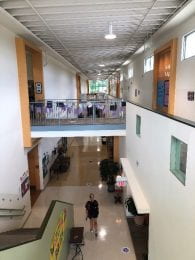 In a monumental move, the Hoeflin Stone House for Early Childhood Development Laboratory School (clinical site for the early childhood education academic unit) and the Center for Child Development (a service unit) merged in July 2020 under the umbrella of the Kansas Institute for Early Childhood Education and Research. The newly combined unit retains its accreditation by the National Association for Early Childhood Education (NAEYC) and licensed by Kansas Department of Health and Environment (KDHE).
In a monumental move, the Hoeflin Stone House for Early Childhood Development Laboratory School (clinical site for the early childhood education academic unit) and the Center for Child Development (a service unit) merged in July 2020 under the umbrella of the Kansas Institute for Early Childhood Education and Research. The newly combined unit retains its accreditation by the National Association for Early Childhood Education (NAEYC) and licensed by Kansas Department of Health and Environment (KDHE).
 Child development laboratory schools, like those found within the KIECER, function to provide pre-service teacher training experiences for students, develop research and associated policy implications, while simultaneously providing a service to the community. The Early Childhood Education academic program offers coursework in the science of child development and pedagogy and requires associated clinical experiences for the bachelor’s and master’s programs.
Child development laboratory schools, like those found within the KIECER, function to provide pre-service teacher training experiences for students, develop research and associated policy implications, while simultaneously providing a service to the community. The Early Childhood Education academic program offers coursework in the science of child development and pedagogy and requires associated clinical experiences for the bachelor’s and master’s programs.
The Kansas Institute for Early Childhood Education and Research has a four-fold mission:
- Provide high quality child care and education that supports the well-being of students, faculty, staff, and administration. This allows them to fully commit their time and attention to their studies and work.
- Provide empirically-based educational opportunities to early childhood education teachers and the broader student body. The Institute provides the clinical sites for early childhood education pre-service teacher education with appropriately credentialed faculty, implementing evidence-based practices. This requires maintenance of KDHE licensure, NAEYC accreditation, and CAEP accreditation requirements for clinical sites in teacher education as well as the capacity to meet standards for teacher education set by KSDE.
More broadly, in collaboration with faculty across campus, students from other disciplines—e.g., physician assistant, nursing, speech and language pathology, dietetics, kinesiology, engineering design, landscape design, music, dance, and more—may be able to meet academic requirements through observation of children’s development, behavior, engagement, and environments through the Institute. Such cross disciplinary work reduces academic silos and creates opportunities for teams of faculty and students to engage around common interests engaging in inter-professional practice.
- Develop and disseminate cross-disciplinary grant-funded and methodologically diverse research for faculty and graduate students with opportunities for undergraduate engagement in, but not limited to, the science of child development.
- Engage with the greater community on outreach and engagement. Through collaborations with groups such as K-State Research and Extension, Kansas Child Care Training Opportunities and others, the Institute will engage communities on issues of child care and education as workforce development.
Regardless of one’s family status, it is hard to miss the demands being placed on families today. The need for many families to juggle working at home while caring for children has created a newfound appreciation for early childhood education and the developmental needs of young children. The Kansas Institute for Early Childhood Education and Research is ready to tackle policy issues related to early childhood, produce longitudinal research on the impact of early childhood education, train qualified teachers and intervention specialists, all while providing the services families need.